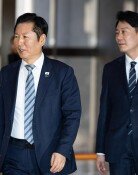The risk of ‘super low yen’ grows
The risk of ‘super low yen’ grows
Posted July. 10, 2023 08:01,
Updated July. 10, 2023 08:01
As the weakening of the Japanese yen prolongs, it is having more and more negative impacts on the South Korean economy. As the yen’s value hit the lowest in eight years, South Korean products in competition with Japan’s in overseas markets are becoming less price competitive. As more people travel to Japan due to the low won-yen exchange rate, the tourism deficit against Japan is sharply rising. Japan’s monetary policy to depreciate the yen is holding the recovery of the South Korean economy back.
The won-yen exchange rate fell to 897 won per 100 yen during the exchange market hours on Wednesday. This was the first time that the exchange rate fell below 900 won per 100 yen since June 2015. The yen’s value depreciated by nine percent this year, showing the biggest drop among the currencies of 10 major countries. While most advanced countries raised base rates to reduce money in the market following the end of the pandemic, Japan alone is sticking to the negative interest rate policy as the country has suffered deflation for a long time.
South Korea’s export companies are experiencing adverse effects. While the two countries have had significantly fewer items in competition since the 2010s, South Korea and Japan are in intensive competition in automobiles, steel, petrochemicals, textile, etc. As Japanese companies are proactively engaging in low-price strategy by leveraging their lower prices in dollars, South Korean companies are struggling due to undermined price competitiveness.
In addition, more and more South Koreans are heading to Japan with a low yen. No. 1 and No. 2 destinations for airline tickets during this year’s peak summer vacation season are Tokyo and Osaka, respectively. South Korea’s tourism deficit from January to May this year has doubled already compared to the same period last year. Some even make profits by buying t-shirts and whiskey in Japan at lower prices and selling them at higher prices in South Korea.
The problem is that the weak yen will likely continue next year. The Bank of Japan announced that its current monetary policy will continue. Japanese Vice Minister of Finance Eisuke Sakakibara, known as “Mr. Yen,” predicted that the yen-dollar rate could rise from 140 yen to 160 yen next year.
The ‘super low yen’ has emerged as a substantial risk factor along with a recession in the global semiconductor market and China’s delayed economic recovery, which are already cited as major causes of South Korea’s poor export performance. The worsening of the tourism balance threatens the positive current balance trend. The South Korean government should develop all possible tax systems and financial support measures to help the country’s export companies compete with the disadvantage of low price competitiveness.







